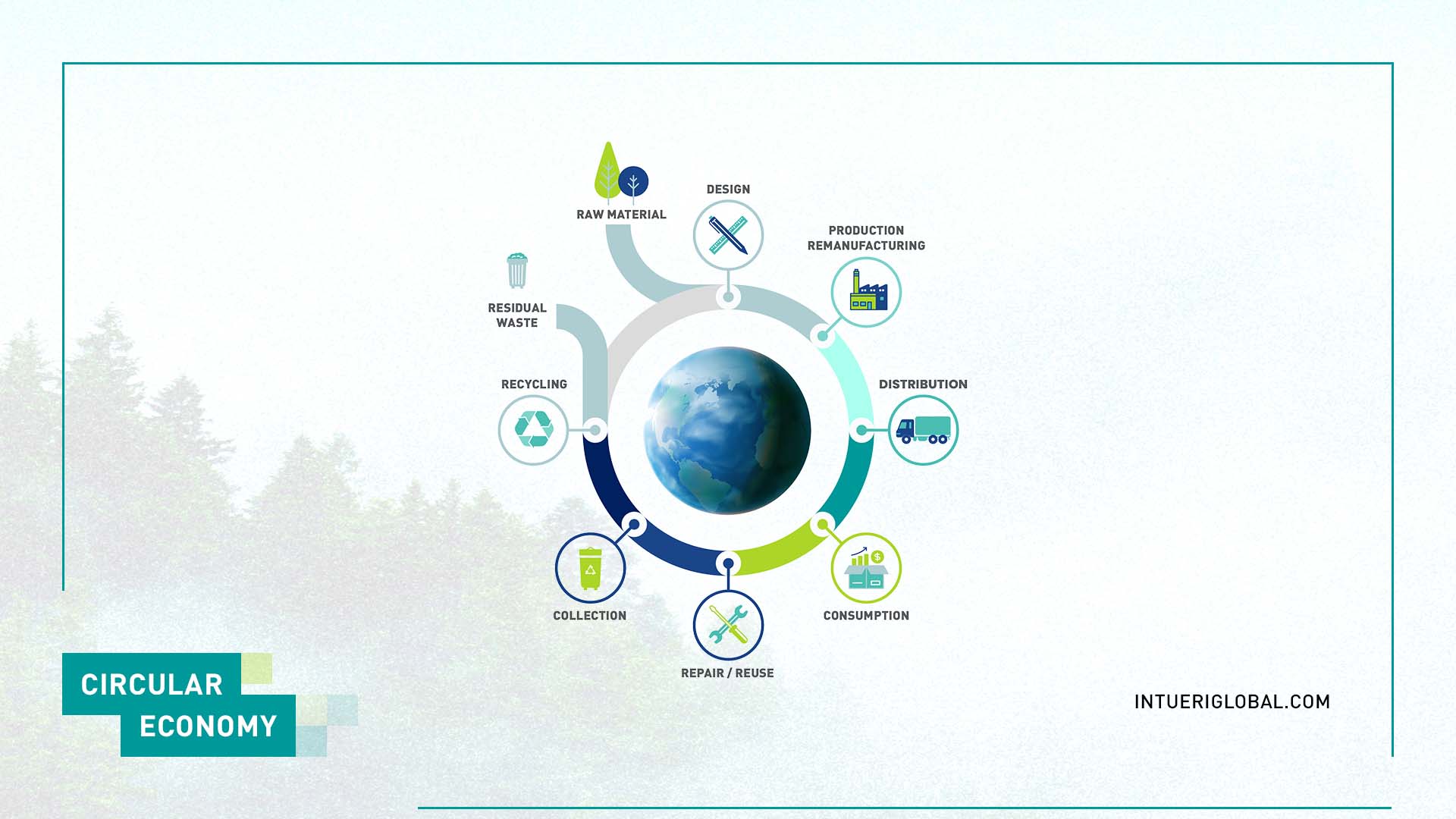Revolutionizing Sustainability: The Circular Economy’s Path to Lasting Impact

Turning the Tide: Water and Waste Management with Zero Liquid Discharge
December 28, 2023
Driving India’s Clean Energy Transition with Biofuels
January 29, 2024
Embracing Circular Economy
Circular economy stands as a transformative paradigm, challenging the status quo of traditional linear models of production and consumption. Unlike the conventional take-make-consume-throw-away pattern, the circular economy envisions a system where materials never become wasted and nature undergoes continuous regeneration. At its core, this innovative approach is driven by the fundamental principles of minimising waste, maximising resource efficiency, and fostering sustainability — all integral components of the impact economy. In the circular economy, products and materials embark on a perpetual journey, sustained through maintenance, reuse, refurbishment, remanufacture, recycling, and composting. Underpinned by three driving principles, all rooted in thoughtful design, the circular economy charts a course toward a resilient system that transcends business boundaries, benefits people, and nurtures the environment.
- The first principle advocates eliminating waste and pollution, emphasising a departure from the throwaway culture that has long dominated our economic landscape.
- The second principle calls for circulating products and materials at their highest value, promoting practices like sharing, leasing, reusing, and refurbishing, thereby amplifying the sustainability quotient.
- The third principle, perhaps the most profound, is centred on the regeneration of nature, recognising the imperative of safeguarding our planet’s health.
Crucially, this groundbreaking model hinges on a transition to renewable energy and materials, shaping a resilient and resource-efficient system that aligns with the principles of the impact economy. By sharing, leasing, reusing, and recycling existing materials and products, the circular economy extends the life cycle of products, minimising waste and optimising resource use. As products end their life, their materials are skillfully retained within the economy through recycling, creating a cyclical process that generates further value. This strategic departure from the linear economic model addresses environmental concerns and positions the circular economy as a resilient and resource-efficient system that champions the triple bottom line—benefiting businesses, individuals, and the environment.
A Win-Win for Business and the Planet
The transition to a circular economy, synonymous with the impact economy and sustainability, yields compelling benefits, seamlessly integrating environmental stewardship, economic resilience, and societal well-being.
Protecting the Environment
Minimizing Resource Depletion: The circular economy is a formidable ally in the fight against environmental degradation. By reusing and recycling products, this model systematically slows down the consumption of natural resources, curtails landscape and habitat disruption, and plays a pivotal role in limiting biodiversity loss.
Greenhouse Gas Emission Reduction: A significant environmental benefit emerges by substantially reducing annual greenhouse gas emissions. Industrial processes and product use contribute to 9.10% of greenhouse gas emissions in the EU, and the circular economy aims to curtail this by fostering sustainable practices in waste management, accounting for 3.32% of emissions. Source
Reduce Raw Material Dependence
Mitigating Supply Risks: Recycling raw materials addresses supply risks and enhances resilience in the face of limited crucial resources.
Create Jobs and Save Consumers Money
Innovation and Job Creation: Circular practices stimulate economic growth, innovation, and job creation, with an estimated 700,000 new jobs in the EU by 2030. Source
Cost Savings: Consumers benefit from cost-effective and sustainable lifestyles through durable and innovative products.
Opens New Opportunities for Companies:
Business Opportunities: The circular economy fosters new business avenues, including refurbishing and resource collection, providing companies with resource security and potential cost efficiencies.
Lowers Carbon Emissions
Sustainable Materials Management: The circular economy minimises greenhouse gas emissions by promoting sustainable material practices.
Aims for Zero Waste
Environmental Goals: Zero waste, a core circular economy tenet, reduces ocean-bound plastics, minimises landfills, and encourages sustainable growth.
Reduces the Use of Non-renewable Resources
Smart Resource Utilization: Prioritizing practices like reusing and refurbishing ensures judicious use of non-renewable resources, contributing to sustainability.
What’s Trending
In response to escalating environmental awareness and consumer demands, businesses are pivoting toward a vital facet of the circular economy – sustainable packaging. Technological strides, including bioplastics and water-soluble options, offer eco-friendly alternatives, aligning with consumer preferences for biodegradability and reusability. Natural materials like seaweed have gained popularity, reflecting a shift toward impactful, sustainable practices. As nearly two-thirds of consumers consciously choose greener options, brands are anticipated to revamp packaging strategies, merging cost savings with eco-conscious initiatives. This trend reflects a broader movement within the circular economy, where recycling, sustainability, and the impact economy converge, reshaping business practices for a more resilient and environmentally responsible future. Source
Success Stories
Patagonia, a pioneer in sustainable practices, exemplifies circular economy principles through initiatives like Worn Wear. Patagonia’s program extends product lifespan and minimises waste by encouraging repair, reuse, and recycling. Additionally, their commitment to sustainable materials, including recycled fabrics and organic cotton, showcases a tangible application of circular economy principles, reducing environmental impact and fostering a more sustainable business model.
Ikea, a global furniture giant, exemplifies circular economy principles through initiatives like its Take-Back Program. Enabling customers to return used furniture for repurposing or recycling, Ikea minimises waste and fosters a circular economy ethos. Their commitment to sustainable materials, such as FSC-certified wood and recycled plastic, further showcases a tangible application of circular principles, reducing environmental impact. Additionally, Ikea’s introduction of circular services like furniture rentals and refurbished item sales underscores its commitment to waste reduction and promoting circular practices. Source
Navigating Challenges
Businesses transitioning to a circular economy have faced setbacks, from logistical challenges in recycling programs to financial strains and strategic misalignment, illustrating the complexity of the journey. Learning from these hurdles is crucial, emphasising the need for robust logistics, careful financial planning, and strategic alignment with consumer expectations for a successful transition.
Not a Transient Trend but Imperative
In confronting escalating global environmental challenges, adopting circular economy principles emerges not as a transient trend but as an imperative shift toward enduring sustainability. Urging businesses to embrace this paradigm for a thriving impact economy, sustainable practices, and recycling initiatives, the call to action is clear: integrate circularity into business models, spearhead innovation, and collectively pave the way toward a regenerative and sustainable future.
Know the Author
Craft an Effective ESG Strategy for Your Organisation
Begin your transformation that elevates your organisation’s reputation, effectively navigate and mitigate risks, entice potential investors, stimulate creative innovation, and uphold environmentally sustainable operations, all while showcasing a strong dedication to contributing positively to society.





